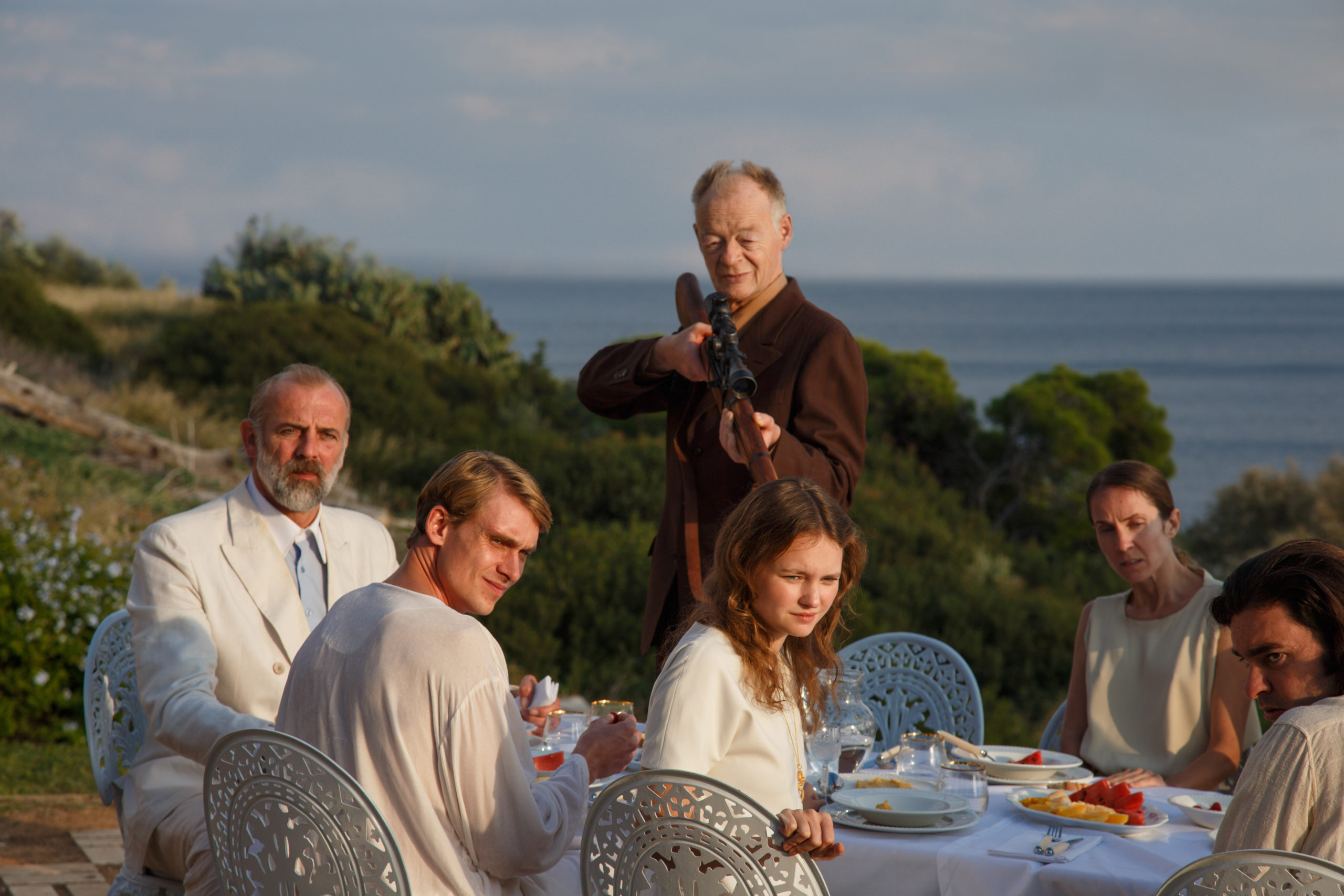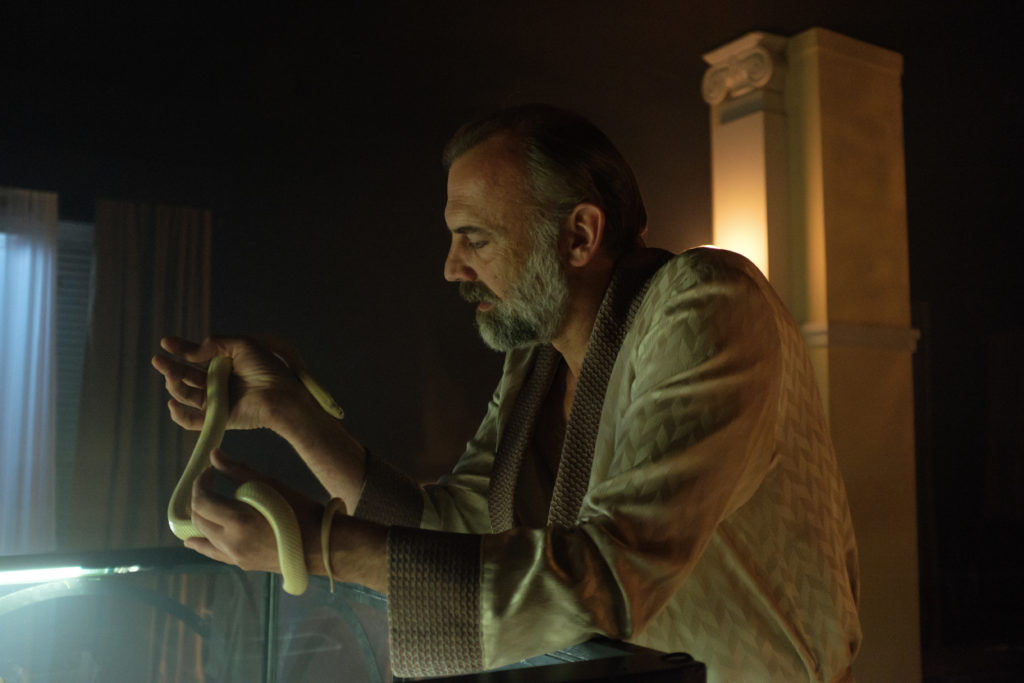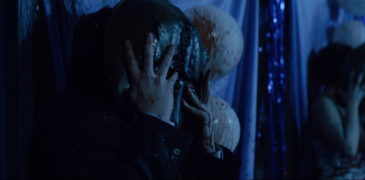
Bringing the Greek Weird Wave touch to German cinema is Der Bunker director Nikias Chryssos, who in his second feature film does at times leave the impression that he’s working with too many obvious sources of inspiration, but manages to overcome all weaknesses with a singularly brave, spectacular third act. A Pure Place is simply one of the year’s best, a film one should definitely not miss at the 2022 edition of the Fantaspoa Film Festival in Porto Alegre.
Two siblings, Paul and Irene, are part of the “Dirt”: the lower class living in a cult led by Fust, a prophet for a so-called goddess who can only be reached through cleanliness of body and mind. Fust isn’t above resorting to child labor in order to mass-produce soap with his name on it. Meanwhile, the only solace the kids have is each other, the ether they use in order to escape reality and the piglets they help raise. When Fust invites Irene to his room, giving her a task that effectively makes her the new high-priestess, this separates her from Paul and makes her part of the ruling class, triggering a chain of events that will forever change the small community.

A Pure Place deals in an array of themes, and for the first hour it can seems like a bunch of notable films from the past decade grinning at each other; although Yorgos Lanthimos’s The Lobster is the one it ends up resembling the most, there is the isolation of Dogtooth, coupled with its paternalism. Fust controls the narrative through sermons that unironically mirror Nazi beliefs, in particular those of the Thule Society (the so-called Elysion the cult members are brainwashed into believing in, a perversion of the Elysian Fields in Greek mythology, almost feels like Ultima Thule). His religion is a mix of Norse mythology, the Wagnerian aesthetics of The Rings of the Nibelungs, and some carefully-placed Dionysian undertones.
Life is a stage for the lucky ones in Fust’s order, as they put on performances to please their leader (who knows that play, as well as work, is necessary in order to assert dominance over a group), and Greek classics like Sophocles, Aeschilus and Euripides are name-dropped. Snowpiercer and Upstairs, Downstairs could be other sources of influence, as there is a strict class hierarchy, and the social order is based on the exploitation of the poor. The “church of light” relies on classical aesthetics and Fust even casually mentions the Ancient Greek habit of sacrificing the ugliest, known as pharmakos. Pigs are good because they offer fat, which can be smeared on and used as a defense against the outer world. But the ugliness, the stench, the dirt, are not desired, and church members are told to purify themselves each day. As a hero of the underclass emerges, the movie begins to feel like a children’s crusade, akin to that of Bad Tales – another movie also seemingly influenced by the Greek Weird Wave.
The “downstairs” setting can look even more like a concentration camp as the film doubles down on its main theme: purity vs. filth. The elite is dressed in white and sits politely at the table, even as its members tear each other apart in conversation or casually shoot a piglet that infiltrates their party. The lower class is covered in dirt, and is put to work; the movie transitions from “child labor” to “child slavery” in an instant, and Chryssos uses escalation like a master, while only showing mild traces of the absurdity of his previous film. In one scene, Siegfried, a thespian with delusions of grandeur, sees Elysion’s light coming from between Irina’s legs. Paul attacks someone twice his size while wearing a pig mask. Constant close-ups of dirty children are there to highlight Fust’s failings. For most of the time, however, the movie is a lot more straightforward than Der Bunker, and perhaps the reason for Chryssos not pulling the same act twice lies in the deeper context of the evolution of both German and Greek cinema over the past decade.

A lot has happened on the “absurd German-language cinema” front between the release of Der Bunker and A Pure Place My Brother’s Name Is Robert And He Is An Idiot was a veritable endurance test, one of the most singular, infuriating, alienating and yet utterly mesmerizing pieces of cinema, itself dealing in “beautiful ugliness”. Time Of Moulting, with its countless self-imposed restrictions and merciless gaze on parasitic childhood, felt like it took viewers as its prisoners as it moved to eventually break some of its rules. Switzerland provided a great candidate with The Girl and the Spider, with its mind-tricks, language redefined as morbid excitement coupled with strange longing, and rooms as empty graves. The one element these movies have in common is the obvious influence of Michael Haneke and Lars von Trier. Chryssos abandons this relative safety and uses the movies of Greek filmmakers Yorgos Lanthimos, Eftymmis Filippou, Babis Makridis, and Athina Rachel-Tsangari as a moral compass. However, with the help of a devious second-act twist, he allows his film to stand on its own, as something entirely novel and different.
“What interested us were the ways in which a family or a group is governed and what kind of impact this has on every member of the group” – Yorgos Lanthimos on his films
Many critics have made the connection between the Greek Weird Wave cinema and the country’s political hardships, and filmmakers like Costa Gavras have investigated the dead-end European politics which isolated the country and led to the turmoil surrounding the 2015 referendum. In his book, “Greek Weird Wave: A Cinema Of Biopolitics”, Dimitris Papanikolaou discusses the movement in the context of biopolitics, a term popularized by Michel Foucault, referring to “a set of social and political practices that focus ‘on disciplining the living being, on optimizing its capabilities and extorting its forces so as to integrate corporeal life into systems of efficient and economic controls’”. Papanikolaou concludes that the “weirdness” of the new Greek films is not a way to escape this situation, but to rearrange the values which have defined the history of Greek cinema.
“It is actually this productive over-controlling of human life – and thus of diversifying the types of control in order to taxonomise, to marketise, to place within borders, frames and systems of reference, and to optimise it (…) This does not mean that there is a clear root, an announced rationale, an identifiable centre of biopolitical control: Instead, there is an archipelago of measures, points of incitement, control and calculation, systems of prediction and normativity. Contemporary biopolitics is not a global localisable power of oppression; it is an over-expansive and dominant logic of governance.” – Dimitris Papanikolaou

A Pure Place fits Papanikolaou’s definition to a tee: Fust governs his island with an iron fist, and he secretly trades goods with a nearby town. The locals describe the island as a “garbage dump” and openly mock the prophet’s principles of purity. Fust’s goddess is actually pretty much the Greek goddess of health, Hygeia, and the man himself a twisted interpretation of Asclepios, the hero of medicine. The effects of Fust’s governance over his followers are explored through the movie’s three main characters and their arcs: Paul, having lived in the dirt his entire life, rejects purity altogether and puts together a counter-ideology, one meant to eradicate light. His philosophy is born out of jealousy after losing Irene, his sister-mother. Siegfried lusts for Irene, and he also takes the opportunity to humiliate Fust in public (although it is not clear how much of his speech is actually Fust manipulating him into a blindsiding power-play). Lastly, Irene’s reaction is the most complex one: she is fascinated by being associated with a goddess, tapping into a source of primal femininity, discovering her first sensual identifications, and rejecting her attraction towards Fust (and the Electra complex), which leads her to be the only one having a degree of freedom, while being the one closest to the snake at all times.
A Pure Place‘s third act is its strongest by far, as it switches between the island and a new, urban setting. At this point in the plot, all bets are off, and some much-needed backstory for Fust is provided, with the “discovery of Elysion” scene being the movie’s crowning achievement. It doesn’t just juxtapose light and dark anymore, it juxtaposes artificial light with Fust’s false light, as disco sequences and ’80s music make their way into the strange fairytale and the children gain important allies. Fust’s own ideology is shown as an inescapable product of his childhood and the strong personalities of both his father and mother, which further links the film to the Greek Weird Wave’s depiction of family.
Chryssos constantly uses clever juxtaposition on the soundtrack, as well as the visual side. When the film is mostly focused on Fust and his point of view, it makes use of the musical system of Ancient Greece, perhaps in order to highlight the idea of harmony as another tool of oppression (the Greeks associated the concept of musical ethos to education and the well-being of the state). However, the third act makes the switch to electronic music, and during the ’70s and ’80s, both Chicago house and Detroit techno were seen as a reaction against the harsh living conditions of the workers, a rejection of old forms. Meanwhile, the radical dance techniques and social lifestyle promoted by Eurodisco/Italo Disco, and its “dancefloor politics” are in strict opposition to the forms of Ancient Greek dance, with its strong ties to religion.
In the movie’s final act, the nightclub becomes the new temple, and its goddess is a half-naked pole dancer. Chryssos brilliantly reshuffles but does not reject the elements that constitute the harsh reality of the children’s upbringing. A Pure Place is a movie that deftly escapes its own derivative roots (will anyone even care that the third act heavily resembles Ti West’s The Sacrament?), impresses with its performances across the board, and ultimately offers a palette of possible interpretations and a timely commentary on bodily autonomy. With his second feature, Nikios Chryssos has created a singularly weird, but utterly compelling synthesis of false religion, biopolitics, late capitalism ideals, and crisis management techniques that should appeal to fans of both Greek and German cinema and is one of the must-see movies of 2022.
We Watched A Pure Place as Part of the 2022 Fantaspoa Film Festival


More Film Reviews
Fishing doesn’t have the best reputation in fiction. Going off literature and film and Dick Cheney, one gets the impression it’s boring, it’s vaguely cruel, and it mostly serves as… There are a lot of bad pants in this movie. Also, bad haircuts, bad sex and, whenever a chair is needed to hit someone over the head, or a table… Almost entirely free of dialogue, Looky-loo (2024) gives viewers the view from a killer’s own eyes as he stalks and plans multiple murders. The nameless killer, gains confidence with each… By all rights Crabs! seems like it ought to be the sort of film that is a complete joke. Nominally it is about a horde of murderous mutated horseshoe crabs… Chasing the dream of a breakout success YouTube video, two urban explorers think they’ve found the perfect location: An old French manor that wasn’t demolished before a lake was dammed…. Disgraced YouTube stars are a dime a dozen, as it is pretty damn easy to become a ‘persona-non-grata’ in this day and age. The disposable nature of online fame has…Sweetie, You Won’t Believe It Movie Review – Fantasia Festival 2021
Cross of the Seven Jewels (1987) – Maybe Everything is Bad, But Half A Werewolf is Better Than None at All
Looky-loo (2024) Film Review – Through the Eyes of A Killer [Unnamed Footage Festival 7]
Crabs! (2021) Film Review – A Love Letter to Classic Monster Movies
The Deep House (2021) Film Review – Drowned Secrets Disturbed
Deadstream (2022) Film Review – The Evil Dead IRL


![Looky-loo (2024) Film Review – Through the Eyes of A Killer [Unnamed Footage Festival 7]](https://www.grimoireofhorror.com/wp-content/uploads/2024/03/Look-Loo-2023-review-365x180.jpg)


